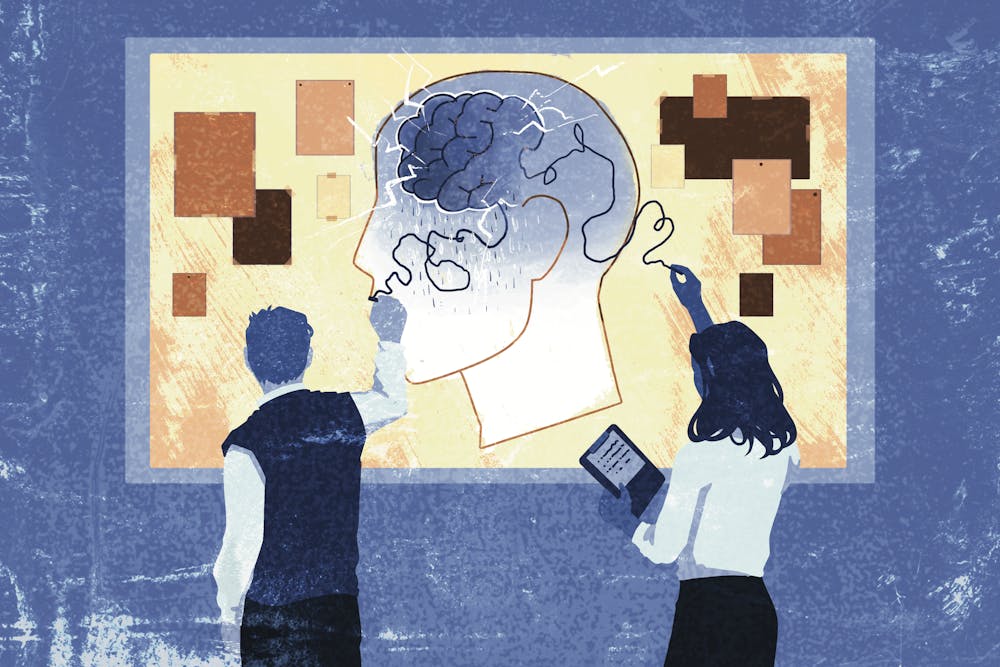When USC English professor James Jacocks was a student in the early 2010s, no one spoke about mental health.
But since he began teaching at USC in 2020, Jacocks, who is also a lead for study abroad for the Capstone Scholars Program, said he believes there has been more mental health support on campus, such as seminars, screenings and workshops.
“I think that the landscape is now in a place where talking frankly about mental health is something that’s just much more accepted culturally,” Jacocks said. “I think that that’s largely unambiguously a good thing."
Professors at USC have had to adjust the way they handle the classroom because of growing concern for mental health, said Susan Bon, a professor in the College of Education. For Bon, the professors have to face how they should deal with stress in a classroom.
”As faculty, you kind of already design your classes to achieve a certain goal,” Bon said. “But at the same time, you want to be sensitive to the fact that if you’re overloading students they might shut down.”
English professor Daniel Kruidenier said he has made adjustments in the classroom, including increased leniency when it comes to absences and assignment due dates.
Students tell Kruedenier that some topics he has in classes that deal with ethical dilemmas trigger them, he said.
”I think right and wrong and good and bad are full of emotion,” Kruidenier said. “So when I’m dealing with students on that topic, I know I’m dealing with something that’s ready to react.
As a result, Kruidenier works to balance critical conversions about right and wrong with sensitivity, which is a hard balance to find, he said.
“No one says, 'Here’s the line, and this is how you should got about it,'” Kruidenier said. “So it’s a bit of a mystery from the teaching perspective, and I think it’s probably learning from experience like anything else.”
The issue of mental health extends beyond just students, Bon said.
“We can’t ignore that academics are sometimes affected by those social needs or physiological needs,” Bon said. “So I think going into this with the right attitude makes you feel a little less burned out and just knowing you got to do your best to help every student fulfill their dreams and goals.”

Jacocks said his mental health journey is a continuous process. It can be difficult to balance interacting with students and managing his own mental health, he said.
While teaching an English class, Jacocks wants to be conciencious when editing students writing because it is an expression of their identities and their background, he said.
“It’s a big responsibility to be in that position of authority, to think critically about what being in that position of authority means and being responsible and thoughtful,” Jacocks said.
Eva Monsma, a professor in the College of Education and program coordinator for the master's in coaching education, said more awareness in mental health results in a rising demand for professionals who are focused on improving it.
Monsma and other faculty members in her department have created a new degree, an undergraduate Bachelor of Science in applied sport psychology and counseling, which will start in fall 2025.
“The supply and demand is definitely something to keep an eye on,” Monsma said. “Because having to wait when it comes to mental health crises is not a good thing.”
Monsma said using on-campus mental health resources, such as the Student Success Center or reaching out directly to mental health support staff for immediate mental health support for students, can help address student's struggles.
Growing mental health concerns can be attributed to the pandemic, Jacocks said.
“The restrictions that came with the first year of the pandemic and the quarantining people had to do," Jacocks. "It was a national trauma I think for a lot of people."
But Kruidenier said he holds a different view.
Kruidenier said he does not invalidate people’s mental struggles, but he does not believe society’s increased awareness will lessen their burden .
Anxiety and depression have been around for hundreds of years and aren’t likely to go away, he said.
“People always have been people, and they always struggle,” Kruidenier said
But the change in culture surrounding mental health is different now, he added.
“It seems to be popular in our culture right now to show concern for what we’re calling mental wellbeing or health of an individual,” Kruidenier said. “If it’s attached to the wellbeing of individuals, I can imagine why people would want to study that.”
Jacocks said he hopes that academics continue to talk openly and critically about mental health as society continues to change.
“Hopefully, that would be a vision for kind of where we’re going in the next couple years,” Jacocks said. “The national conversation around mental health being much more open and people being much more willing to be vulnerable.”

